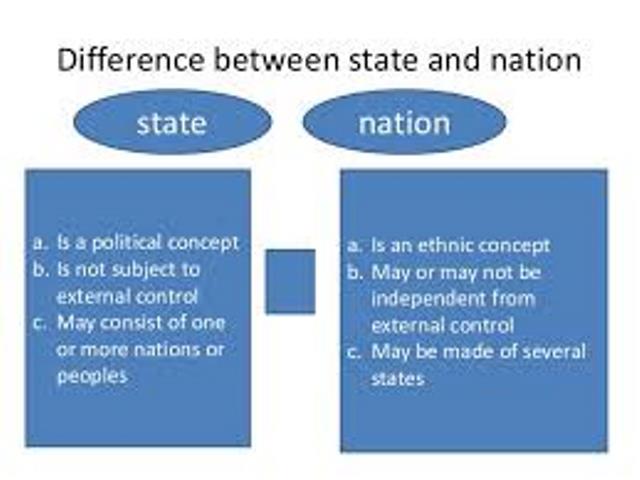State & Nation: Definition, Characteristics and Differences
A state may be defined as a politically organized body of people occupying a definite geographical territory with an organized government, free from external control, and with power to enforce and regulate the conduct of its people.

Characteristics of the State
1. Population: For a state to exist, it must have a number of permanently resident people, defined as citizens, while there are other residents not regarded as citizens but called aliens or foreigners. the number of people that can make up a state (population) has no limit.
2. Territory: A state must occupy a definite territory which separates it from other neighboring states.
3. Government: Every state has a machinery referred to as government, that makes laws and enforces such laws for the purpose of regulating the conduct of its people.
4. Sovereignty: A state must be sovereign, i.e. it must have supreme power over its own affairs, and make and enforce laws free from external control.
5. Nationalism: A citizen of a state should be loyal by way of attachment to, and identification with the aspirations and hopes of the state. A citizen should also love the state always.
6. Recognition: A state must be recognized by other states.
Difference Between A State and A Nation
The distinction between a state and a nation includes:
- A nation is made up of people with homogeneous characteristics, people united by common ties. It is the attachment to these common ties or aspirations that is sometimes referred to as nationalism. A state on the other hand, may be made up of homogeneous and /or heterogeneous peoples.
- The state is sovereign while a nation may not be. For a nation to be sovereign, it must be independent, having superior power to make laws and enforce its laws.
- A state has a definite territory, but a nation may have no definite territory. For example, a state like Nigeria has a definite territory, while the Yoruba nation spreads through many West African states.
Difference Between State, Government and Other Societies
- The state includes both the government and other human associations.
- Membership of a state is obligatory while that of other associations is voluntary.
- The state is permanent, but government and other human institutions and associations are not permanent. For instance, the laws which government make and execute change periodically.
- Government, the state and other societies depend on each other for the activities designed to realize the needs and aspirations of the people.
- Rules made by the state are generally applicable to, and binding on all, while the rules guiding other association are applicable to their members only.
- The state may use force to enforce it laws and regulations. Other associations cannot ensure obedience to their rules and regulations through the use of force.
- The state has legal powers to fine, incarcerate or pass the death penalty upon violators of its laws, but other associations have no such authority over their members.
